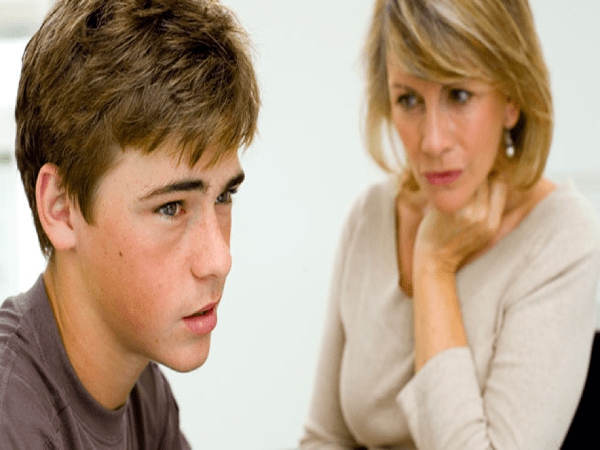Parents are the best teachers of their children, the words they say will often affect their children for life. However, the most painful words in the world are often the words parents say to their children. If you don't want your children to be hurt, don't say these words to them again!
1. "Everything parents do is for their children's good"
At first, "Parents do everything for the best of their children" is just a saying that moves oneself, exalts one's own self-sacrifice. At first glance, this is a saying full of love, but in reality, it controls and constrains children, destroying them in the name of love.
There was a boy who grew up under the control of his parents. From small things like what clothes to wear, who to be friends with, even what school to choose, what major, his mother wanted to intervene. His mother's great love made him unable to resist, he could only accept, gradually he lost the ability to live independently, also had no communication skills, living like a big child.
Being held back for a long time, without freedom, eventually made him tired both physically and mentally, and suffered from depression.
When others asked, his mother could only cry in regret: "I did everything for the good of the boy, who knows...".

When educating children, avoid saying sentences that are imposing but difficult to understand. Illustration photo
2. "You are the only hope of the family"
Don't put the meaning of adult life into "making children promise". Although academic results are important, they are not the only conditions for a successful life. A strong will, an optimistic attitude, and a kind, empathetic heart are all things that children cannot lack in the future.
Many parents have high expectations for their children, causing their children’s lives to be drowned in the ambitions and perfectionism of adults. Because of this ambition, parents do not care about what their children like or their abilities. And when they cannot meet those expectations, some children turn to negative thoughts, making their parents regret.
Instead, you can say: "We believe you can do it, we understand you."
3. "If you don't work hard, you will regret it for the rest of your life"
In the book "How to Talk to Children to Build Motivation, Solve Stress, and Make Your Home Happy", two educators and psychologists William Stixrud and Ned Johnson assert that provoking fear is one of the least effective ways to stimulate children's internal motivation. It even puts pressure on children. Children will feel stressed, gradually leading to avoiding advice from parents.
In addition, adults are presenting a vision that is quite far beyond the children's understanding. Therefore, this statement is considered by the two experts to be meaningless and counterproductive. Instead, wise parents should encourage their children. The authors give an example: "You can't multiply three-digit numbers yet, but you will learn quickly. Look, you can multiply two-digit numbers fluently."
We can also show our children that the task at hand is not easy, but if they continue to practice, they will conquer it and confidently face future challenges. "I believe you will do well" - this is the suggestion given by the expert.
4. "Look at other people's children"
If you hate being treated like that, don't do that to others. If your child says: "Look how beautiful her mother is", "Look how nice her father is", "Look how good her child is in a good school", "Look how rich her family is", as a parent, can you accept these words? If you can't accept it, why say the same thing to your child?
Accept your children's mediocrity, just like how children never asked their parents to be excellent!

Being compared to other children makes children both miserable and gradually forms in them the belief that they are always inferior. Illustration photo
5. Parents are ashamed of their children
If your child makes a mistake and knows it is wrong, there is no need to continue to nag and emphasize their mistakes. Parents need to help their children solve the problem, not vent their own negative emotions.
Many parents always think that their children are still children, do not consider them as friends to listen to their children's thoughts, always oppress them, force them to do what they want. If they do not get what they want, they will make their children listen to nagging, harsh words or threats. Instead of doing that, parents need to be calm, choose to sit next to their children, talk and explain to them. Any problem will be resolved. Loud voices are like a string with many knots, making the problem more complicated.
6. "Don't worry, mom/dad is here"
As children grow older, they want to be free. Parents cannot be with their children all the time or monitor their every move. If children always think that their parents will solve everything for them, they will tend to behave more recklessly, even irresponsibly with their actions.
Parents should also allow children to make mistakes. Because we cannot protect our children in a glass cage forever, let them explore the world around them, learn how to stand up after falling. The role of parents is to guide, analyze right and wrong, and provide reasonable solutions instead of reassuring them that parents will take care of everything.
Especially in adolescence, children will be curious about the world, the more you forbid, the more they will find ways to "cross the line". But this does not mean you should stay silent or let children act on their own. We also need to have times when we firmly say no, especially analyzing the risks and responsibilities that may arise.
7. "Why are you so stupid?"
"You're so stupid, you'll only be picking up trash in the future," some parents often scold their children like this without knowing that their child's IQ is related to their parents' genetics.
This genetic factor accounts for 70%, so don't say that the child is stupid, this is equivalent to you criticizing yourself. The remaining 30% may be through efforts to become smarter, but has been defeated by parents like you. Being a parent without knowing how to encourage children, only knowing how to criticize and sarcastically, this will hurt the child's immature soul!
8. Parents can't teach their children anymore, right?
For teenagers, changes in behavior and impulsive actions can confuse parents and cause conflicts between the two generations. When parents want to point out their children's wrong behavior, they should talk to them like friends, explain their concerns instead of scolding or saying harsh words.
Not to mention, the more parents say this, the more children want to resist. In this case, parents and children become two opponents in a war. The more parents want to emphasize their authority, the more children want to break this boundary and prove their worth.
Source: https://giadinh.suckhoedoisong.vn/8-cau-cha-me-khon-ngoan-khong-bao-gio-noi-voi-tre-vi-thanh-nien-172240629173700101.htm

























































Comment (0)